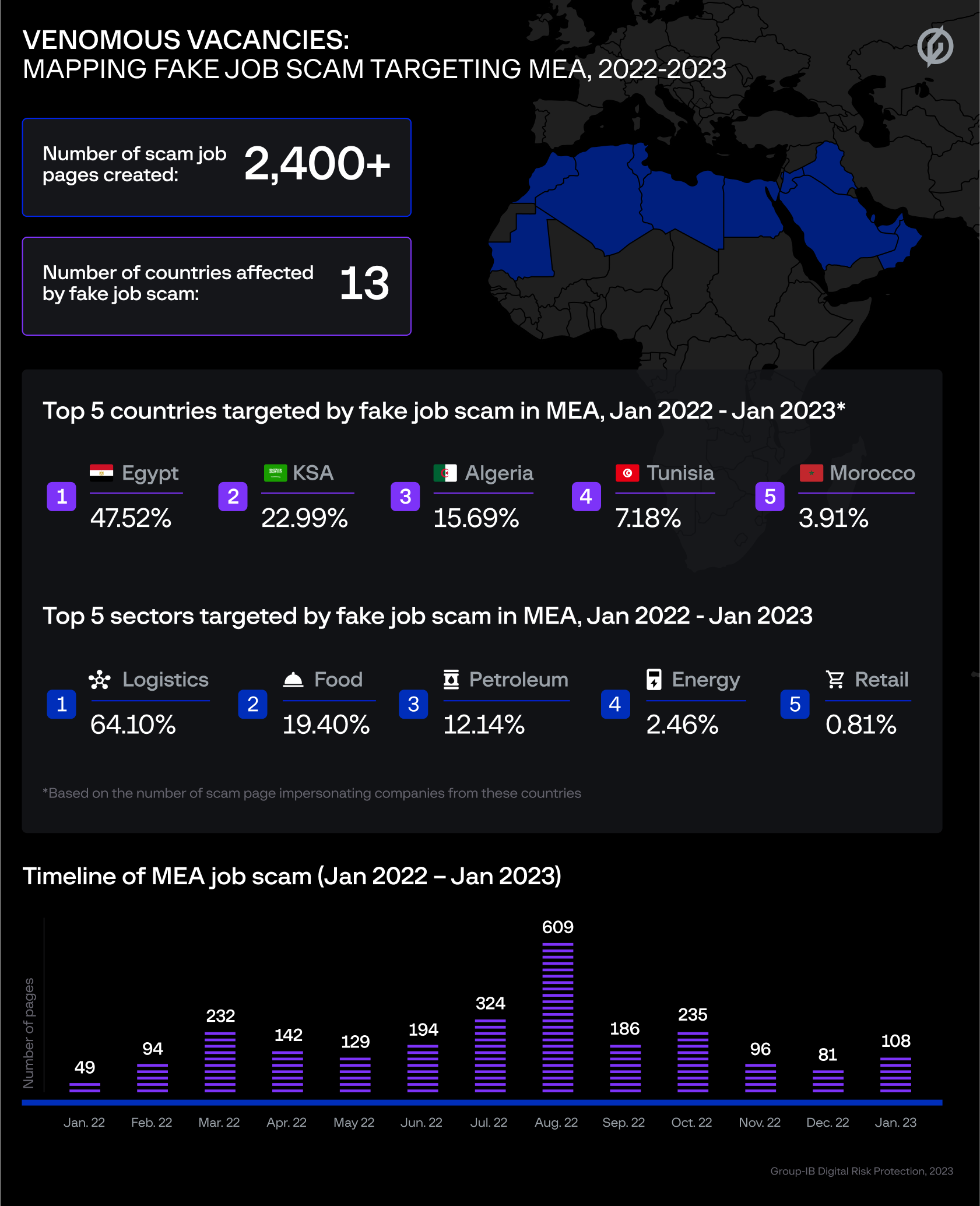News
Cybersecurity Firm Uncovers 2,400+ Fake Arabic Job Pages
The scam targeted internet users across 13 Middle East and North African countries.

Global cybersecurity leader Group-IB has revealed new research from its center in Dubai detailing a widespread fake job scam campaign targeting Arabic speakers in the MENA region.
Digital Risk Protection experts used AI and text analyzing tools to uncover over 2,400 fake job pages impersonating companies from 13 countries. The posts were created on social media platforms throughout the entirety of 2022.
On the job pages, fraudsters spoofed more than 40 of the MENA region’s largest companies. They published vacancies in Arabic offering salaries too good to be true, including “4,500 euros (USD $4,800) for drivers and painters”. Once interested victims interacted with links on the pages, they were taken to fake phishing sites where they were asked to enter login credentials and passwords.
Which Countries Were Targeted?
Arabic-speaking individuals were the exclusive targets of this particular scamming campaign, with Egyptian companies most frequently spoofed by the criminals.

According to Group-IB, “48% of all the fake profiles created on Facebook spoofed companies from Egypt. Organizations from Saudi Arabia (23% of all scam pages), Algeria (16%), Tunisia (7%), and Morocco (4%) were also frequently mimicked as well as offering individuals jobs at the 2022 FIFA World Cup in Qatar”.
What Industries Were Selected?
The scammers responsible for the fake job pages made adverts across multiple industries, though logistics firms were a popular target (64%). Group-IB noted that “scammers targeting MENA users are particularly fond of impersonating logistics enterprises due to the high potential ROI. The food and beverage (20% of scam pages) and petroleum (12%) industries were also heavily impersonated by the scammers, with one particular company being impersonated on more than 1,000 fake pages”.
Also Read: Is Your Phone Hacked? How To Find Out & Protect Yourself
Staying Safe Online
Group-IB warned internet users to stay vigilant and always confirm URLs when following links that supposedly lead to a company’s website — a particularly important habit on social media sites. Users should enable two-factor authentication (2FA) for all online accounts supporting the security feature and ensure they never use the same password across multiple accounts.
News
Samsung Smart Glasses Teased For January, Software Reveal Imminent
According to Korean sources, the new wearable will launch alongside the Galaxy S25, with the accompanying software platform unveiled this December.

Samsung appears poised to introduce its highly anticipated smart glasses in January 2025, alongside the launch of the Galaxy S25. According to sources in Korea, the company will first reveal the accompanying software platform later this month.
As per a report from Yonhap News, Samsung’s unveiling strategy for the smart glasses echoes its approach with the Galaxy Ring earlier this year. The January showcase won’t constitute a full product launch but will likely feature teaser visuals at the Galaxy S25 event. A more detailed rollout could follow in subsequent months.
Just in: Samsung is set to unveil a prototype of its augmented reality (AR) glasses, currently in development, during the Galaxy S25 Unpacked event early next year, likely in the form of videos or images.
Additionally, prior to revealing the prototype, Samsung plans to introduce…
— Jukanlosreve (@Jukanlosreve) December 3, 2024
The Galaxy Ring, for example, debuted in January via a short presentation during Samsung’s Unpacked event. The full product unveiling came later at MWC in February, and the final release followed in July. Samsung seems to be adopting a similar phased approach with its smart glasses, which are expected to hit the market in the third quarter of 2025.
A Collaborative Software Effort
Samsung’s partnership with Google has played a key role in developing the smart glasses’ software. This collaboration was first announced in February 2023, with the device set to run on an Android-based platform. In July, the companies reiterated their plans to deliver an extended reality (XR) platform by the end of the year. The software specifics for the XR device are expected to be unveiled before the end of December.
Reports suggest that the smart glasses will resemble Ray-Ban Meta smart glasses in functionality. They won’t include a display but will weigh approximately 50 grams, emphasizing a lightweight, user-friendly design.
Feature Set And Compatibility
The glasses are rumored to integrate Google’s Gemini technology, alongside features like gesture recognition and potential payment capabilities. Samsung aims to create a seamless user experience by integrating the glasses with its broader Galaxy ecosystem, starting with the Galaxy S25, slated for release on January 22.


























